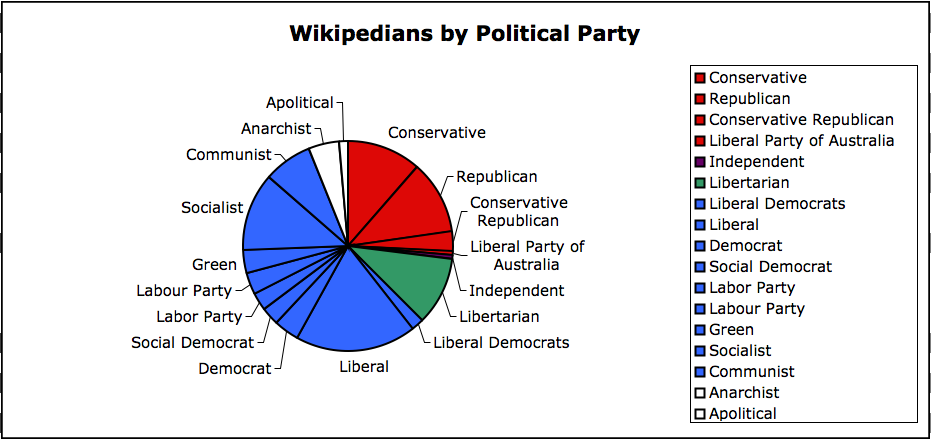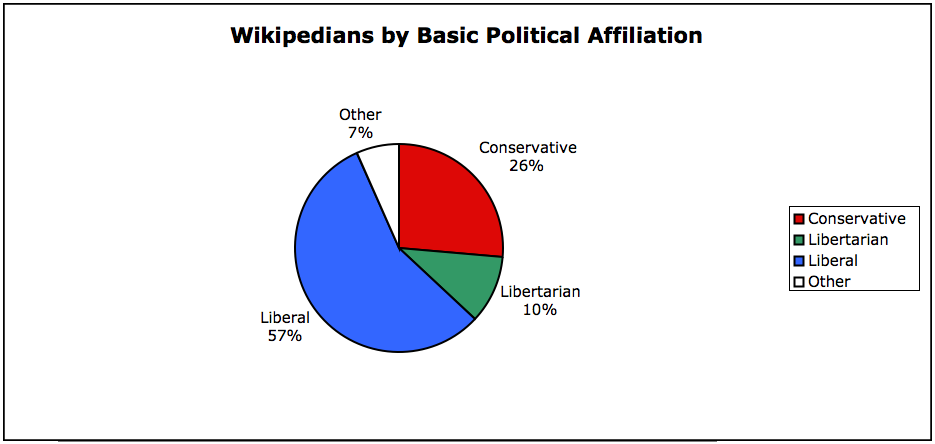Wikipedians by Political Party
/Wikipedia founder Jimbo Wales once said Wikipedians are "more liberal than the U.S. population on average, because we are global and the international community of English speakers is slightly more liberal than the U.S. population." I have crunched the numbers and it appears he is correct. Wikipedia is more liberal than America.
DATA SET
Of the 14,000,000 registered Wikipedians, it appears 347,000 have created user pages. Of these 347,000 users, 23,190 individuals, or 6.7%, appear to have professed a political affiliation in the bios on their user pages by mentioning key phrases like "Liberal Party of Australia" or "Social Democrat," etc. This provides the following data set:
Liberal, Conservative, and Libertarian Wikipedians
There are some 57 countries where English is the official or de facto language. Any of these peoples and more may be contributing to the English language Wikipedia. Lumping together these Wikipedians into four basic categories, we get the following totals:
These totals contrast the overall US population in three important ways.
- Liberals are slightly overrepresented as compared to the US population
- Conservatives are decidedly underrepresented as compared to the US population
- Libertarians are dramatically overrepresented as compared to the US population
To illustrate the disparity between the American population and the Wikipedian population, here is a chart showing the USA by political party (2008), using data courtesy of ElectionStudies.org:
Libertarians
What is particularly interesting is the preponderance of Libertarians on Wikipedia. While Libertarians carried 0.04% of the vote in the latest US presidential election, they carry even less of a vote in other English speaking countries. Indeed, it is somewhat unclear if any functioning Libertarian party currently exists in any English-speaking country besides the US. So it is statistically interesting to find 10% of Wikipedians identifying as Libertarian.
Methodology, Notes, and Margin of Error
*This data was assembled using Boolean searches of the seed "en.wikipedia.org/wiki/User:".
*Various search terms were excluded to prevent duplication. For instance, a UK Wikipedian self-identifying as a "Liberal Democrat" must not be double counted in searches for the terms "Liberal" and "Democrat." Thus, Liberals were counted as follows:
liberal democrat site:en.wikipedia.org/wiki/user: liberal -democrat -"australia" -philippines site:en.wikipedia.org/wiki/user: democrat -liberal -social site:en.wikipedia.org/wiki/user: Social democrat -liberal site:en.wikipedia.org/wiki/user:
Note that the "Liberal Party of Australia" is center-right, and thus excluded from searches for "Liberal." Userpages that mentioned both "Philippines" and "Liberal" were excluded as well because while the Philippines has a "Liberal Party" there is no corresponding "Conservative Party" so a fair tally of left-vs-right Wikipedians would have been disrupted.
*"Labor party" and "Labour party" were conducted as separate searches seeing as Wikipedians may belong to the Labor Party in Jamaica, New Zealand, Australia, the UK, etc.
*"Independents" are almost certainly undercounted. The word "Independent" appears in many contexts in user bios. Thus, this search only counted "Independent Party."
*Many Wikipedians identify as "Anti-Communist." So the search for Communist excluded the term "anti."
*Similarly, "Nazi" was not included in this search as so many Wikipedians appear to identify as "Grammar Nazis" or "Deletion Nazis" or "Wikipedians who have been called Nazis by other Wikipedians," etc.
*While India and Pakistan represent massive English speaking populations, their political parties - being somewhat unique and endemic - were not counted in this search.
*Further exclusions could be added to these boolean searches to refine the data. For instance, a Wikipedian saying, "I disagree with the Labor Party" would be counted as a member of the Labor Party in this methodology. Nevertheless, it is assumed such search errors would occur equally for all parties and thus keep proportions consistent. Furthermore, random spot checks for associations like "Hate" & "Labor Party," "Dislike" & "Labor Party," and "Disagree" & "Labor Party," yield zero results. And moreover, the 6.7% sample size is fairly robust when accounting for margin of error.



